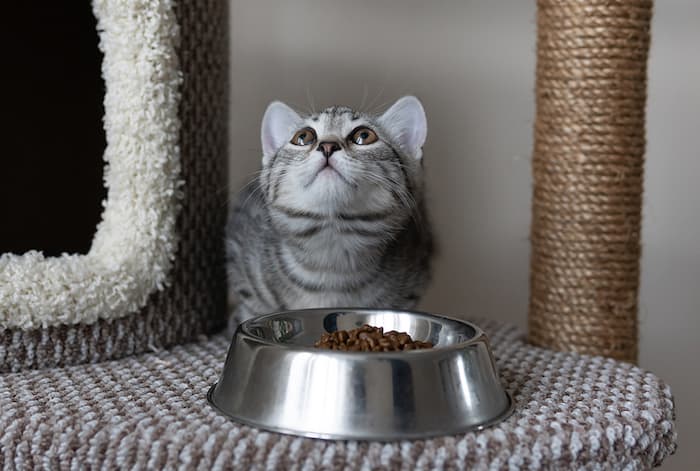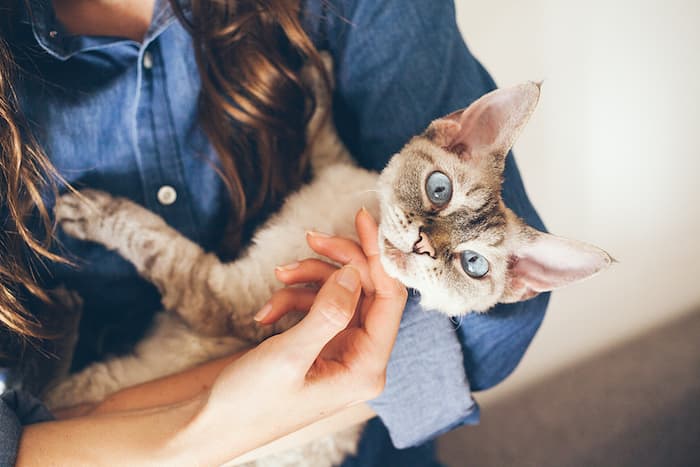Around 5 million pets are brought to the nation’s animal shelters each year and over half never end up being adopted. 70% of all cats that go to shelters don’t make it to adoption. For this reason, we strongly encourage you to go to a local shelter to find your next pet.

Where to Adopt a Kitten
Many kittens and cats are killed each year because the shelters cannot handle them all. Therefore, the best idea for a prospective cat owner is to adopt one from a shelter. You can find a mixed breed and purebred cats at any shelter. If you are very specific about the traits that you want your kitten to have, then it may make sense to go to a breeder. Breeders breed cats that are predictable with respect to their traits. However, mixed breed cats are many times healthier over the long run. The interbreeding of cats to make traits predictable limits the gene pool, making those cats more susceptible to disease.
Supplies Needed Prior to Bringing it Home
The supplies that you will need before your kitten comes home are:
- Kitten Food – ask your veterinarian which is best
- Food and water dishes
- A litter box with litter in it
- A bed
- Medications that are needed – ask the veterinarian
- Toys
- A collar that has the pet’s identification information
- A carrier

Kitty Proofing Your Place
- Remove poisonous plants
- Lock up cleaning supplies
- Put away medicines
- Stow away fragile objects that you don’t want broken
- unplug power cords when not in use
- Tie a knot in drapery cords
- Keep the toilet lid down
- Secure the screens on windows and doors
Further Reading
Newborn Foster KittensCaring for Your Breed of CatSigns of a Sick Kitten
Transporting a Kitten to Your Home
There are basically three ingredients to successfully transporting your kitten home. You need a cat carrier, a blanket and a hot water bottle. There are a few reasons that you should invest in a cat carrier. First of all, cats feel more comfortable in a closed space. Since the car will most likely be a new experience for the kitten, you want to make the ride as comfortable as possible. Also, if the kitten throws up or relieves itself, it will be contained in the carrier. Using a blanket and a hot water bottle will also make the cat feel more comfortable. Ideally, you should use a blanket that the kitten usually sleeps on. Being taken away from its mother and siblings can be traumatic for the kitten, so you want to make it feel as comfortable and warm as possible.

Making the Kitten Feel Comfortable
It is obvious that a new environment may be intimidating to a new kitten, so you should do a few things to make them more comfortable when they first arrive at your home. As mentioned before, a kitten will feel more comfortable if it has something that it is familiar with, such as a blanket that it usually sleeps on.
Make the kitten feel more comfortable by not making any changes in its environment. Find out what kind of litter that the kitten was using and use it for its litter box. Try to put all of the things that the kitten uses in a quiet space, such as a spare bedroom.
Introducing the kitten to your house and family should be done slowly so that it won’t become overwhelmed. Think about introducing your house one room at a time. Also, the cat should meet family members one at a time.
How to Feed a Kitten
If the kitten is very young, it may need to be bottle-fed for its first weeks of life. The best thing for the kitten is to be nursed by its own mother or another available mother in its absence. After about four weeks of nursing, the kitten may be weaned and transitioned to kitten food.
Kittens are obviously going through development, so they need more energy than a grown cat. Therefore, a kitten must eat about three or four times a day. It must eat specially formulated kitten food. Select a high quality kitten food that meets the nutritional requirements of kittens established by the American Association of Feed Control Officials.
Kittens should be fed at least some canned food as part of their diet. Kittens have small teeth and it is important that they receive all of the nutrients that they need.
Of course, it is vital that kittens be given water in a dish that they can get to at any time. Use supplements only if your vet recommends them. Many foods contain all of the vitamins and minerals that they need and giving them supplements in addition to the food may be harmful to them.
Newborn Foster KittensMore About What to Feed Your Cat

Advice on Grooming
Cats are well known for their superior grooming skills. Most cats will take care of the majority of their grooming needs. However, sometimes they need a little helping hand. This is especially the case for long-coated breeds that can get their coat tangled up.
With respect to brushing, it is a good idea to get a kitten used to it while it is still a kitten. Most cats that have been introduced to brushing as a kitten will actually enjoy the grooming.
Short-haired cats may need no brushing or just a once-over once a week. Long-haired cats such as Persians may need daily attention.

With respect to their claws, outdoor cats that get a lot of activity may only need their claws cut on rare occasions. House cats and cats that don’t get a lot of activity need their claws cut more often. Always have someone cut the cat’s claws who knows how to avoid bleeding by cutting off too much. A scratching post is a good way to keep claws short.
Most short-haired cats rarely need a bath, if ever. Long-haired breeds may require more frequent bathing. Even a short hair cat sometimes will need a bath if they get dirty from an oil slick or diarrhea.
Learn More About How to Groom a Cat

Play Time
Playtime for kittens is important for both their health and well-being and for adopting social skills.
You don’t necessarily need fancy toys to get a cat interested. Sometimes a piece of string or a stick can become the cat’s play prey. There are some toys that you can buy at the pet shop that is good for cats. Catnip scented toys are particularly a cat favorite.
Kittens learn certain social rules about play from their siblings. For instance, a kitten can learn about play that is too rough from its interactions with its siblings. If a kitten gets bitten hard, the next time around it will play more gently.
Chasing and even catching and fetching are favorite cat games. Some cats will return the toy to you and some will not.
Walking a cat on a leash is something that you can do to give your cat exercise and it will adapt to it particularly if you start it out at a young age.
One thing that is true is that there is no replacement for another cat that can serve as a playmate. It may be the case, though, that the kitten will not bond as closely with its owner if it lives with another cat.

Encouraging Good Habits
You should try to encourage your kitten to do things only when it is in a good mood. If you try to force a kitten to do something that it doesn’t want to, then it may become resistant to your wishes.
It is a good idea to handle the kitten’s paws a lot. This will get it used to the type of handling that it gets when it gets its nails clipped. This kind of handling training would apply to all things that the kitten has to go through.
You should rub the kitten’s belly often to accustom it to being pet there. This way it won’t nip at people who try to pet it there when it gets older.
You should encourage the kitten to use a scratching post. This is good both for its claws and the preservation of your furniture. When your cat is still a kitten, introduce the scratching post to them gently by putting its claws against the post.
Get your kitten used to being held. If you do this when they are kittens then they will be more sociable with people when they are fully grown cats. It is wise to have many different people hold the cat to make it more widely sociable.
Health and Vet Checkups
An initial trip to the vet for shots and consultation is a must. You will need to ask the vet about the right kind of food to feed it and the specific things to look out for in the kitten’s breed. After this, it is only necessary to bring the kitten into the vet for a checkup once a year. Of course, if the kitten displays any unusual symptoms or behavior, it is imperative that they be taken to the vet as soon as possible.
Further Reading:
Why Get Pet Insurance?Getting A PetAdditional Pet Care Guides
Reviewed By: Tim Winter

Tim Winter has a strong affection for pets and wildlife. His years of experience caring for various types of pets has led him to share his knowledge with others on the best practices in pet care. Tim holds a Bachelor of Science from the University of Oregon School of Journalism and Communications.
More About Cat Care
The secret to removing pet stains and odors: Expert cleaning tips
Dealing with pet stains and odors can be challenging for any pet owner. It’s important not only for keeping a tidy home but also for maintaining a healthy environment for both humans and their furry friends. While there are many products on the market, the true secret to effectively removing pet stains and odors lies ... Read more
Cats aren’t just fun companions. They’re good for you too!
Cats have been our favorite pets for centuries. They are fun, affectionate, and keep mice at bay. But cats also have proven positive effects on our mental and physical health. Find out what they do and how, right here! Disclaimer All information in this text is intended to inspire and inform. If you have mental ... Read more
Top 10 Best Cat Accessories to Try
As devoted cat parents, our furry friends hold a special place in our hearts. We love to pamper them with gifts and toys, showing our affection in the most delightful ways. Here’s a comprehensive guide to the most stylish cat accessories that will surely make your feline purr with joy: Rogz Urban Cat Collar: Safety ... Read more
Cat Allergy Shots for Kids: Providing Relief and Comfort for Allergic Children
Cat allergies can be a frustrating experience for both kids and their parents. From runny noses and itchy eyes to skin rashes and hives, the symptoms can be irritating at best. While there are treatments available that help dampen the symptoms, they don’t address the root cause: the allergy. Luckily, allergy immunotherapy is available to ... Read more

I have two Calico Persian kittens in my house at 3 months old they are cute. They stay in my living room. Their long hair falls into a home in the air. What can I do for them.
My 5 week old kitten, has diarrhea, and is throwing up, after nursing, what do I do.
You should take your kitten to the vet for a checkup.
My kitty keeps scratching the couch. How can I get her to stop? I’m going to get a scratch pad in hopes it helps. Any suggestions?